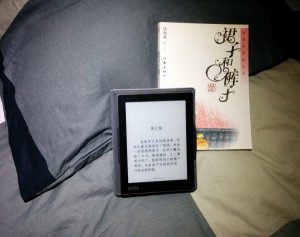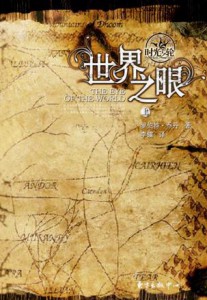 This month’s challenge is about reading Chinese, and that seems to be as good a reason as any to publish an article about habit formation and reading practice.
This month’s challenge is about reading Chinese, and that seems to be as good a reason as any to publish an article about habit formation and reading practice.
As is the case for listening, learning to read Chinese takes a lot of time and you need to form habits that allows you to read enough text. I have already written an article called Habit Hacking for Language Learners, but in this article, I’m going to focus explicitly on reading. Naturally, part of the answer is also challenges like the one that started this Monday (join here if you haven’t already).
Now let’s look at how to increase the time you spend reading Chinese.
Solve all practical problems first
A requirement for reading a lot in Chinese is to always have something to read. If you feel that you want to read, but don’t have anything at hand, you have failed to do the basic preparations. To make sure you always have something to read, you should keep reading material with you at all times, plus put reading material in places where you’re likely to have some spare time.
The easiest way to do this is to have text stored on your phone. This can be in the form of a simple text file, a real e-book or some other format, it doesn’t really matter. I find Pleco’s reader add-on very useful (direct link here), because it gives me a pop-up dictionary integrated with the text I’m reading. I’ve read several novels in this way. I don’t think a small screen is a problem, in fact it might be a good thing because it avoids overwhelming me with too much text at once.
Controlling your environment
Apart from this, you should also put reading material where you typically feel like reading. I have an e-reader and I keep that next to my bed so I can read before falling asleep. I usually also put something to read in the bathroom.
Finally, you should remove distracting elements from these same locations. Remove your e-books in English from your phone, don’t have a novel in English on your bedside table. It should require no effort to start reading Chinese, considerably more if you want to do it in your native language.
Find interesting material to read
One of the trickiest parts when learning to read Chinese is the dearth of interesting reading material. I suggested some resource collections both in the challenge article and in a separate post about reading material earlier this week, but we all like different things and there’s no guarantee you will like the same texts as I do.
Don’t hesitate to give up on a text because it doesn’t interest you, spend some time trying to find something as interesting as you can. It’s usually preferably to read a text which is too hard or too easy rather than reading a text you really don’t like.
 Unless you’re an avid reader, I also suggest reading short pieces of text. A novel might feel overwhelming and take you 50 hours to finish, but a short article or story doesn’t take that long. Bite-sized learning is usually a good idea. One way of doing this is by reading comics, which of course has many merits apart from this.
Unless you’re an avid reader, I also suggest reading short pieces of text. A novel might feel overwhelming and take you 50 hours to finish, but a short article or story doesn’t take that long. Bite-sized learning is usually a good idea. One way of doing this is by reading comics, which of course has many merits apart from this.
On the other hand, sometimes reading a long text can be more relaxing, but this is probably only for advanced learners. I’m still reading a translation of Robert Jordan’s The Wheel of Time in Chinese and it’s not that hard to read because I’m so used to it. Not changing to new texts all the time makes reading relaxing for me.
Finally, if you have any suggestions to other learners for what to read, especially beginners and intermediate learners, please share in the comments!
Don’t check every single word if you don’t want to
Reading is fun, flipping through a dictionary isn’t (even if it’s electronic). If you don’t already have a large vocabulary, it’s likely you will encounter many new words when reading authentic Chinese texts. If you want to, you can look up all these words, but I think this kills motivation like nothing else. Instead, I usually only look up words that are crucial for understanding the plot or words that recur several times.
This is why a pop-up dictionary is so useful: you can look up words in a second, which is fast enough to not really interrupt reading. Note that learning the word is a different decision and one you can usually postpone. Only learn words you think are important and common. Every rare word you learn means you have less time to learn a common one.
Naturally, if you really want to, feel free to look up as much as you want, I’m just saying that you don’t need to if you don’t want to.
Conclusion
I think the key to forming habits is to control the environment rather than to control yourself. Make sure you have the necessary reading material in the places you’re most likely to need it, remove English reading material from these same locations. This is easier than trying to avoid the temptation to make things easier and revert to English. Combine this with a challenge and you’re ready to go!
When it comes to motivation, the reading material itself is really important, but it also matters how you approach it. You don’t have to learn everything, reading in Chinese needn’t be a chore. Skipping things you don’t understand is perfectly okay if you get the gist anyway. Keep in touch with other learners, see what they like and exchange ideas for what to read!

10 comments
Do you mind if I ask where you found of copy of WOT in Chinese? I’d absolutely love to pick up a copy!
I’ve read the translations to traditional Chinese and they are available online in most book shops I’ve seen. I’ve also found about half of them second hand, which is a lot cheaper. I have no idea how hard/easy they are to get hold of elsewhere!
It’s probably not high literature, but something I like to do is read Chinese clickbait. It’s easy to read when it’s on my newsfeed all the time.
http://www.knowledger.info/
My first Chinese book I read completly is called 三体 (finished a few weeks ago). It is a science fiction book about about humans getting in contact with an extraterrestial culture. I am not a quite advanced reader (as I said, that was my first book) but I think books of this genre and in the scientific context might be a easier read, because many technical term are self explaining. So here you have it, there is three parts of 三体, so plenty of reading material for (I think) intermediate chinese level.
Good article. I’ve been reading the Harry Potter books in Chinese, which is nice because I already know the story, so it makes it easier to understand. I also have a few Chinese books about math and science- especially dinosaurs, because they are awesome. 🙂 The key is to find topics that I’m really interested in, and that makes it more motivating.
I’m a fan of reading Harry Potter translations, too, but children’s literature in general is often a good choice because the story structure and plot are usually a little simpler, and so is the choice of vocabulary. My first Chinese book originally written in Chinese was 根鸟, but I got bored halfway through and dropped it. Now I’m reading 狼图腾, which is a great book – at least the first 12 pages are, because that’s as far as I’ve gotten since I started reading a month ago 🙂
Emily, could you (or, perhaps, someone else on this site), please, recommend some good children’s literature to me? Specifically, I mean fiction literature written by Chinese authors for Chinese children in Chinese, and not translations from other languages.
In fact, a few months ago I asked this question to a couple Chinese friends of mine and they answered that they didn’t really know any such literature. (!) They said that when they were small children themselves, their parents did read something to them, but that they didn’t read anything themselves because, naturally, they didn’t know enough Chinese characters at that small age. Then, during their school years, they didn’t read any literature at all, except for textbooks, because the school load was so high that they barely managed without any extra activity. So, they actually started reading something on their own only after they became adults, and naturally, it wasn’t children’s literature.
I also heard a lot of stories about how the children in Mainland China have to study in a literally “24/7” mode, including weekends, and how hard it is, so I’m kind of keep wondering if children’s literature in China really exist?
倪匡 books are scifi novels. In terms for language, to me it’s to equivalent of Hardy Boys & Nancy Drew.